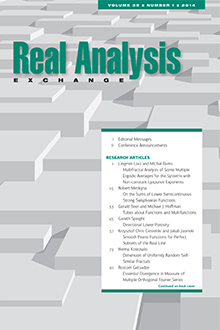Abstract
Let $f_{(n)}$ and ${\underline f}{_{(n)}}$ denote the $n^{\rm th}$ Peano derivative and the $n^{\rm th}$ lower Peano derivative of the function $f:[a,b]\to $\mathbb{R} .$ We investigate the validity of the following statements.
$(M_n)$ If the set $H=\{ x\in [a,b]: {\underline f}{_{(n)}} (x)>0\}$ is of positive outer measure, then $f$ is $n$-convex on a subset of $H$ having positive outer measure.
$(Z_n)$ The set $E_n (f)=\{ x\in [a,b] : f_{(n)} (x)=\infty \}$ is of measure zero for every $f:[a,b]\to \mathbb{R} .$
We prove that ($M_n$) and ($Z_n$) are true for $n=1$ and $n=2,$ but false for $n\ge 3.$ More precisely we show that for every $n\ge 3$ there is an $(n-1)$ times continuously differentiable function $f$ on $[a,b]$ such that $f_{(n)} (x)=\infty$ a.e. on $[a,b] ,$ and that such a function cannot be $n$-convex on any set of positive outer measure. We also show that the category analogue of ($Z_n$) is false for every $n.$ Moreover, the set $E_n (f)$ can be residual. On the other hand, the category analogue of ($M_n$) is true for every $n.$ More precisely, if $\{ x\in [a,b] : {\underline f}{_{(n)}} (x)>0\}$ is of second category, then $f$ is $n$-convex on a subinterval of $[a,b].$ As a corollary we find that $E_n (f)$ cannot be residual and of full measure simultaneously.
Citation
Miklós Laczkovich. "Infinite Peano Derivatives." Real Anal. Exchange 26 (2) 811 - 826, 2000/2001.
Information





